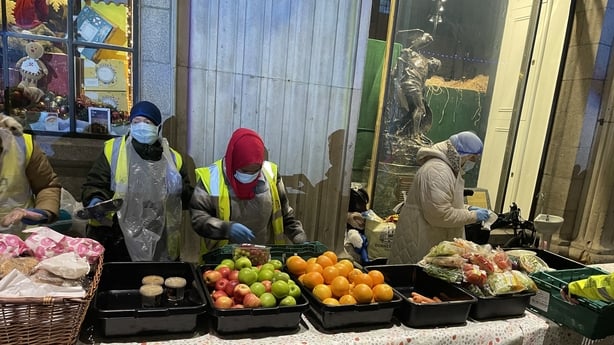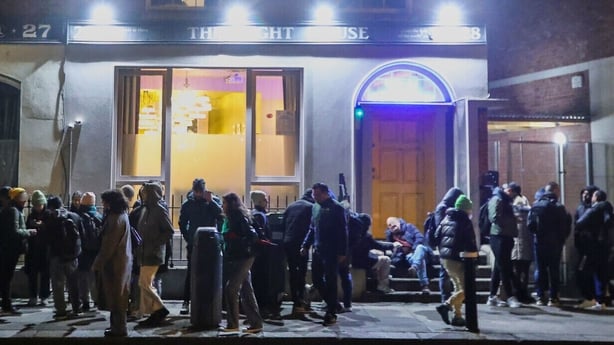It’s a cold Friday evening in Dublin city centre.
On Grafton Street a crowd has gathered around a busker, but over on O’Connell Street a queue has formed for a very different reason.
It’s around 6.30pm, and the line stretches from the GPO and around the corner onto Henry Street. There are around 50 people in it, and they are waiting for food.
The line continues to grow as The Muslim Sisters of Eire unpack goods from a van before giving it out from 7pm.
This is a scene that plays out every night of the week in Dublin, with different volunteer groups handing out hot dishes on different days.
They operate in central areas. Some do it from Westmorland Street, with others on Grafton Street depending on the evening.
But their future is not certain.
Proposed bye-laws
Dublin City Council is currently in the process of drafting bye-laws that would restrict them – and this is because of a number of concerns.
Not all of the volunteers are vetted or trained to be dealing with vulnerable people, while the Taoiseach’s Taskforce for Dublin noted that their locations run a risk to the privacy and dignity of those they help.
There were also concerns over security and anti-social behaviour.
The exact details of the proposed bye-laws are not expected to be published until the second quarter of this year, while a spokesperson for Dublin City Council said that they would not mean a ban on the soup runs.
It would instead aim to ensure they are provided “in a safe environment for both operators and users of the service through the granting of a permit setting out operating hours, locations, restrictions and adherence to any other relevant regulations that apply to these services”.
This would essentially mean services would be prohibited from operating at prominent locations, and possibly told to move indoors with no indication as to whether they would be assisted in doing so.
There has been a lot of reaction to the news.
‘They can’t stop us helping people’
ISKON’s (International Society for Krishna Consciousness) Dublin Krishna Temple give out free vegetarian meals outside the GPO on Thursdays through its Food for Life programme.
The programme’s manager Keith Eustice said they served around 200-300 plates per night over December.
“I think it’s ridiculous that they want to stop people helping their neighbours” he told RTÉ’s This Week radio programme.
“If they want to bring in that sort of bye-law they need to put the infrastructure in place first. They need to build huge industrial kitchens. They can’t stop us helping people.”
ISKON’s food is made in an industrial kitchen, and its volunteers have undertaken food and safety handling courses, but what’s not clear for them at the moment is whether the council would allocate them a space to work from if these bye-laws were introduced, or whether they would need to source it themselves.
Councillors to vote
These laws, once drafted, would need to be passed by the city’s councillors to be implemented.
Labour councillor Dermot Lacey said he would only support them in a situation where services are assisted in improving their standards. He said the council needs to work with the voluntary sector in a “collegiate way rather than in an instructive way”.
“They are out doing the work that the State isn’t doing, so rather than penalising them, let’s work with them.”
Mr Lacey said he would vote against new bye-laws if he believes that no better alternative is offered.
“If you are hungry and somebody offers you a bowl of soup you’re not going to be concerned about whether the person is trained or not.
“So while we should strive for a better provision of services, we should strive that people are trained to provide those services, we have to make sure that we don’t withdraw the inadequate until we are providing better services.”
The Muslim Sisters of Eire is one of the larger operations running on the city’s streets and is registered as a charity. Its staff are vetted and trained, but founder Lorraine O’Connor said it would be a challenge for smaller soup runs to jump through the same hoops.
“I bent over backwards to try and comply with everything. I’m not saying other soup runs aren’t, but I still think putting rules and regulations in can just crush the empathy that’s happening.
“Some of these soup runs are just people like your Ma or your Da who are coming out with goodness in their heart and compassion.

“To get registered with a charity takes a lot of money and time. [They need] accounts and bank accounts.
“These people don’t have that and I know because we are a registered charity, we have to get our accounts audited and it’s a big thing. But for a normal every-day soup run that pops up, they’re being pushed into a corner because they’re not going to be able to do that.”
Change needed
Those drafting the bye-laws would say that these rules are aimed at improving services by setting a higher standard.
In 2020, UCD Professor of Social Policy Michelle Norris co-wrote a review commissioned by the Dublin Regional Homeless Executive on day services for people who are homeless.
She said that although the soup runs are “obviously necessary” she added that providing them on the street “isn’t a dignified solution to their needs”.
She said she believes the city council needs to move services indoors as well as disperse them more broadly across Dublin rather than having so many operating from central locations.
“I do acknowledge that people are volunteering to provide these services with the best possible intentions. They are worried about people who are homeless and worried about people who are in food poverty.
“I do acknowledge that many people clearly need access to this food provision. But it needs to be done inside, in a way which can meet people’s needs in a dignified way. It needs to be much more evenly dispersed around Dublin and not concentrated within a small geographical area around O’Connell Bridge.”
Outreach ‘undermined’
Professor Norris added that some of the soup runs can also make outreach services less effective.
She said charities which are funded by Dublin City Council, such as the Capuchin Day Centre and the Simon Community, use food as a way to connect with people and then in turn provide them with other services such as showers, clothing, access to medical facilities, addiction treatment, hostel referrals and other things.
“The Simon Community is funded by Dublin City Council to provide an on-street soup run and on-street provision of food and for homeless people that’s a really valuable and supportive service because the Simon Community have trained staff and access to medical services and other support services,” she said.
She added: “Providing food can help Simon Community staff build relationships with homeless people, and sometimes the unmanaged provision of food services by voluntary groups can undermine the effectiveness of those services.”
Growing a service
Over on Pearse Street, the Lighthouse Café is serving up some curries.
It is run by Tiglin, a charity that had previously run the ‘No Bucks Café’ from a bus on O’Connell St.
Tiglin provides outreach, crisis homeless services, residential rehabilitation programmes as well as aftercare supports, housing, and opportunities in education and employment.
Often the Lighthouse is where people first meet, and for many it is where their journey to a better life began. Founder Aubrey McCarthy said they serve anywhere up to 500 or 600 people every day.
“We do breakfast, we do lunches, and we do dinner. What’s interesting about our service is we’re the only service that’s open in the evening.

“Hot food, bingo, live music, a doctor, a barber, a whole lot of support services – more than just food.
“Most of the people want to chat, connect, and forget their vulnerable circumstances for a couple of hours and that’s why they come here.
“But it’s also about progressing. Trying to get people into housing, get people into apprenticeships, education, jobs, and we have a marvelous record for doing that.”
Mr McCarthy said that council officials had come to him and CEO Phil Thompson when they were operating the ‘No Bucks Bus’ a few years ago.
He said trying adhere to their regulations was a “real negative” at first, but now he looks back on it and believes it was the start of a “fantastic” journey that led to them being able to expand and help more people.
He believes the proposed bye-laws could be the start of more good news stories – but only if both Dublin City Council and the Dublin Regional Homeless Executive “get this right”.
“I do feel there are a lot of soup runs, there are a lot of people who are well meaning, they want to help out.
“But the safety and the dignity of the service user – that has to be first and foremost at the centre of what is changing.”
Mr McCarthy added that on-street services cannot be restricted unless there is a better alternative provided to replace them.
He also said that if such a bye-law came in overnight he does not believe the Lighthouse currently has the capacity to cater to a potential increase in demand.
“I think the idea to put rules and regulations in place will protect the service user, however implementing those rules and laws and regulations, that’s going to be tough because where do the people go?
“So the likes of the Lighthouse needs to be supported from a DCC and DRHE perspective if we were to see an influx of more people.”
